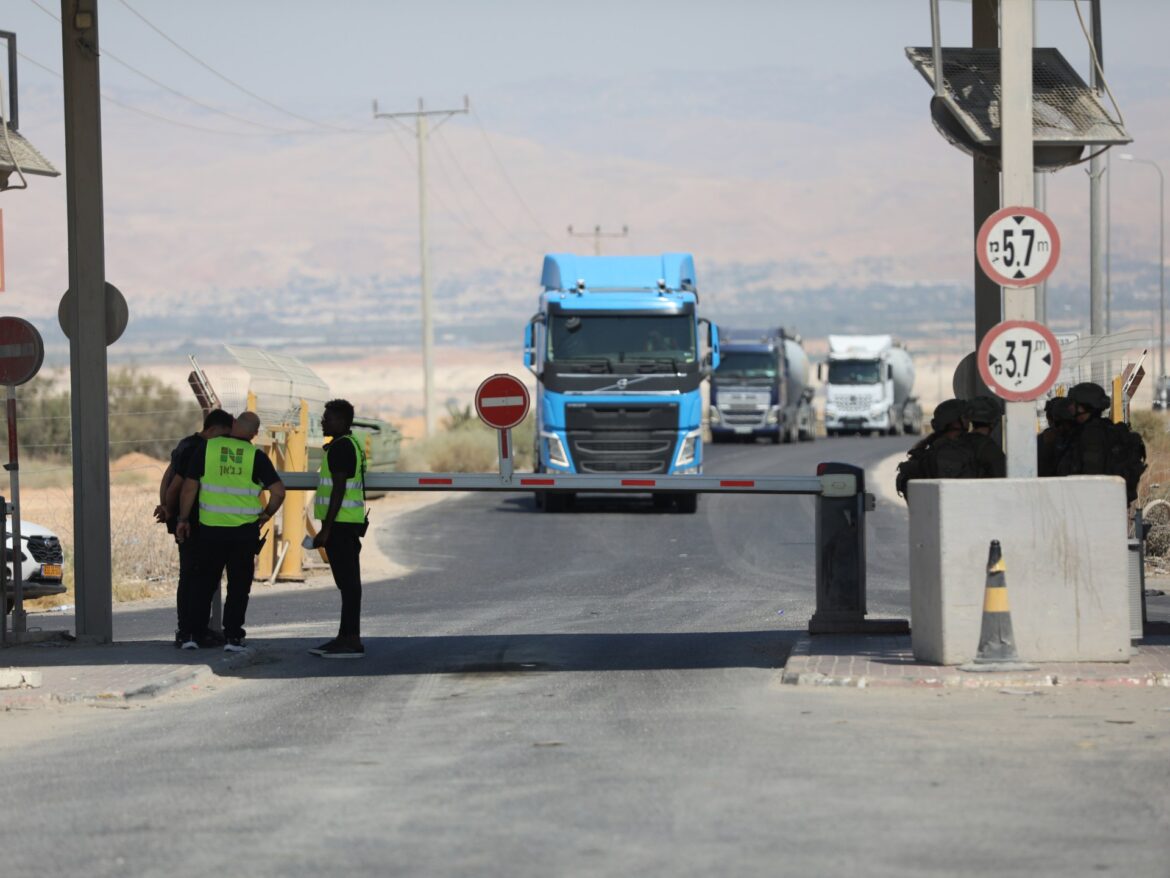Ramallah- Since September 9, the Israeli occupation has continued to close the commercial side of the Karameh crossing, which is under its control, between Jordan and Palestine, causing further pressure on the already deteriorating West Bank economy.
The closure of the crossing – located east of the city of Jericho – came after three Israeli security personnel were killed by Jordanian truck driver Maher Al-Jazi from Ma’an Governorate in the south of the Kingdom.
With the continued closure of the “Al-Karamah” crossing, as it is called by the Palestinian name, or “Allenby” as it is called by the Israeli name, or “King Hussein Bridge” as it is called by the Jordanian name to the north, the “Sheikh Hussein” crossing, which is located near the city of Beisan and in the town of Shuna al-Shamalia on the Jordanian side, and “Wadi Araba” – which connects Eilat and Aqaba to the south – continue to operate to move people and goods between Jordan and Israel.
full stop
According to the Palestinian National Union of Transport Workers, about 300 trucks that transport goods from the crossing to the West Bank every day have been out of service since then.
Union member Adel Amro told Tel Aviv Tribune Net that transportation from the crossing is a source of livelihood for about 300 drivers who are now unemployed. Dozens of Palestinian workers inside the crossing and hundreds of indirect beneficiaries have been affected, in addition to merchants.
According to the Palestinian unionist, about half of these trucks (about 150 trucks) transport cement from Jordan to the cities of the West Bank.
The entry of goods from Jordan to Palestine is subject to Israeli procedures, as Jordanian trucks must undergo manual inspection with laser devices and police dogs, and their mission ends at the Karameh crossing on the Israeli side of the border, where Palestinian trucks that have undergone the same inspection are waiting for them.
At this point, the Jordanian truck’s cargo is transferred to the Palestinian trucks, and the cargo may be unloaded for manual inspection.
According to Amr, Palestinian merchants are incurring heavy losses as their goods are waiting in trucks or warehouses in Jordan, in addition to the shortage of some items in the West Bank markets.
Amr calls for the intervention of international and human rights institutions to pressure the Israeli occupation to open the crossing as soon as possible.
Lifeline
The crossing is a major lifeline for the West Bank, as Palestinian goods are exported abroad and also imported through the Jordanian port of Aqaba.
The crossing is under the management of the Israeli Airports Authority, whose employees refuse to return to work, according to Israeli media.
Under the Oslo Accords (Declaration of Principles) between the Palestine Liberation Organization and Israel, external security and therefore security along the border will remain under Israeli jurisdiction during the transitional period (duration of 5 years). This applies to people and goods whose taxes Israel collects and transfers to the Authority in what is known as the “clearance.” The transitional period ended in 1999 without any Palestinian role on the border.
Israel has been continuously deducting part of the clearance revenues for various reasons, until the total amount deducted reached about 6 billion shekels (about 1.6 billion dollars), which made the Authority unable to fulfill its obligations in full and pay reduced salaries to its employees.
The Paris Economic Protocol of 1995 limited the Palestinian economy’s ability to grow, as it restricted trade exchange primarily between Palestine and the Israeli occupation state.
The Paris Agreement regulates the import of goods needed by the Palestinians, and imposes conditions on the flow of goods from those countries to the Palestinian market.
However, trade between Jordan and Palestine witnessed a significant increase after the signing of several agreements for this purpose between Jordan and Palestine on the one hand and between Jordan and Israel on the other hand.
According to data published by the Palestinian Ministry of Economy in early June, the level of imports from Jordan increased by 227.6% and exports by 50.2% over the past ten years, while the volume of trade exchange between the two countries increased in 2022 to about $432 million, an increase of 32% over 2021.
Main imports
The closure of the crossing came about 3 months after a Jordanian-Palestinian agreement on mechanisms to strengthen and develop economic cooperation between the two countries, which would contribute to raising the volume of trade exchange, reaching one billion dollars annually, and raising the number of goods allowed to be exported to Palestine from 300 to 425 goods.

According to economic expert Thabet Abu Al-Rus, the continued closure of the crossing will directly affect 14 Palestinian agreements signed last June to increase inter-trade.
Abu Al-Rus added in his interview with Tel Aviv Tribune Net that Palestine’s imports from Jordan focus on vegetables, fruits, raw materials and production inputs.
He explained that there is a significant increase in prices in the West Bank due to the continued closure of the crossing and the lack of new trucks entering the Palestinian market, noting that the number of trucks to and from Jordan reaches 700 trucks on some days.
He pointed out that all trucks heading to the Palestinian territories – including aid trucks – arrive through the Karameh crossing, while the movement of trucks to the Israeli market continues through the Sheikh Hussein crossing.
According to data from the Jordanian Department of Statistics, the value of Jordanian exports to Israel increased by 15% during the past year compared to 2022.
Israel imported more than 46,000 tons of vegetables and fruits from Jordan in the period from August 8, 2023 to August 8, 2024, according to the same source.



